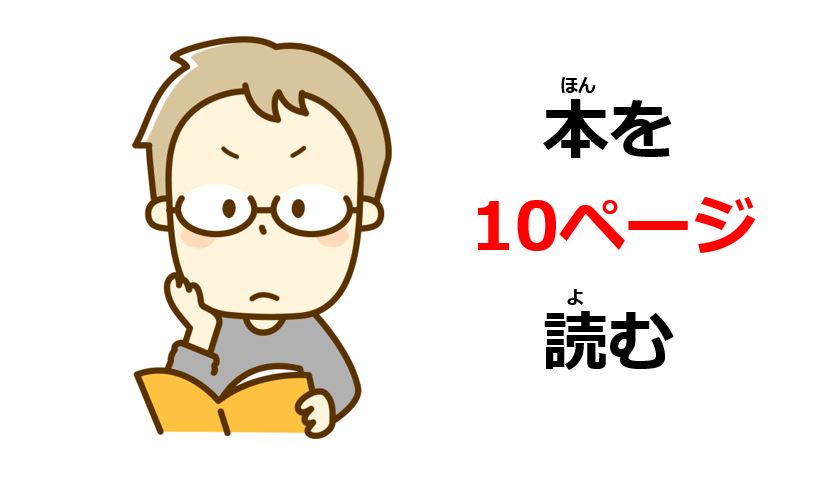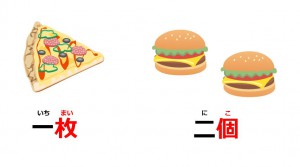In the last two lessons you learned the Japanese counting system in terms of pronunciation and counters. Although it will take some time to memorize all of them, we think that you have the basic knowledge now. In this lesson, let’s learn how to use numerals in a sentence.
How to Express Japanese Numerals in a Sentence
Numerals basically appear in two different ways. The first is to express plurality with nouns like, “I will read three books.” The second is to express supplementary information like, “I will study at 11:00am.” Here, we will focus on the former one since we plan to pick up the later in another section.
Basic Two Sentence Patterns
Numeral + Counter + の + Noun
| [私 は / が] | 3冊の本を | 買う / 買います |
| [Topic / Subject] | Direct Object | Verb |
| [I will] buy three books. | ||
In the first sentence pattern, you utilize the function of の: Explanation. This can express not only an amount, but also attributes (*Look at the third and fourth examples below). This usage can appear with any parts such as subjects (が), objects (を), targets (に), means (で), etc.
| 2人の先生が家に(来る / 来ます)。 The two teachers come to my house. |
| 5人の友達に手紙を(書く / 書きます)。 [I will] write a letter to five friends of mine. |
| 1リットルのコップを(買う / 買います)。 [I will] buy a glass which holds one liter. |
| 七色の虹が(現れる / 現れます)。 The rainbow with seven colors will come out. |
Noun + Particle + Numeral + Counter
| [私 は / が] | 本を3冊 | 買う / 買います |
| [Topic / Subject] | Direct Object | Verb |
| [I will] buy three books. | ||
In the second sentence pattern, numerals and counters are placed after particles. Unlike the above, this can only work to specify an amount and appear with the particle が and を. Note: if you use this with other particles, the sentences don’t make sense.
| 友達が4人家に(来る / 来ます)。 Four friends of mine will come to my house. |
| リンゴを3つ(食べる / 食べます)。 [I will] eat three apples. |
Comparison
| 16GBの携帯電話がいい(です)。 => Mobile with 16GB [storage] is good. |
=> Wrong! |
The first one is correct because only the first sentence pattern “Numeral + Counter + の + Noun” can express an attribute.
| 次の旅行は3つのホテルに(泊まる / 泊まります)。 As for the next travel, [I] will stay at three hotels. |
=> Wrong! |
The second sentence is wrong because the sentence pattern: “Noun + Particle + Numeral + Counter” can be used only with the particle が and を.
[adsense]
The Difference of the Two Sentence Patterns
| 5冊の本を(売る / 売ります)。 [I will] sell five books. |
| 本を5冊(売る / 売ります)。 [I will] sell five books. |
When both sentence patterns express an amount, there is no difference in meaning. However, when the first sentence pattern expresses an attribute, a difference will appear.
| 100ページの本を(読む / 読みます)。 [I will] read the book which contains 100 pages. |
| 本を100ページ(読む / 読みます)。 [I will] read 100 pages of the book. |
The first example indicates that the book contains 100 pages (attribute), but there is no information on how many pages he/she will read. On the other hand, the second example indicates he/she will read 100 pages (amount), but there is no information that how many pages the book contains.
How to Express Approximate Numbers
In English you can express approximate numbers by placing “about,” “around,” and “approximately” before numerals. In Japanese, you can express it in two ways: by placing particular words before or after numerals.
Placing 約 or およそ Before Numerals
| 約100人の学生が(集まる / 集まります)。 About 100 students will gather. |
| 書類をおよそ1000枚(作る / 作ります)。 [I will] make about 1000 documents. |
The usage is very simple and the nuance of the two words are almost the same.
Placing ぐらい or ほど After Numerals
| 1メートルほどの魚を(食べる / 食べます)。 [I will] eat the fish which is approximately one meter long. |
| 単語を1000個ぐらい(習う / 習います)。 [I will] learn about 1000 words. |
The nuance of the two words here is different. ほど sounds formal and is preferred in writing while ぐらい sounds casual and is preferred in speaking. You may sometimes find くらい instead of ぐらい. They have the same meaning and are interchangeable.
| だいたい1メートルほどの魚を(食べる / 食べます)。 |
| 単語をだいたい1000個ぐらい(習う / 習います)。 |
Some like to use だいたい, which should be placed before numerals with ほど and ぐらい. By using だいたい, you can make sentences slightly more casual.
Which Should You Use, Kanji or Numerals in a Sentence?
Numerals are generally more common. There are three cases where you should use kanji.
1. When You Write Large Numbers
If you say 90 million by using only numerals in a sentence, it will be like this: “90,000,000円のマンション だ / です ([it] is an apartment priced at 90 million yen).” That’s not easy to read. Therefore, you should write it like this “9千万円のマンション だ / です.”
2. When You Use Set Phrases
There are words that include numbers in the words. For example, when you say WWII in Japanese, numerals are usually not used, i.e. 第二次世界大戦.
3. When You Write from Top to Bottom
| 9 0 0 0 円 |
九 千 円 |
Japanese people don’t prefer writing numerals from top to bottom like the left. In everyday life, when you write a letter, you usually need to write your address from top to bottom. In that case, please use kanji to express numbers.
Summary
- There are two basic sentence patterns:
- Numeral + Counter + の + Noun, e.g. 3冊の本を(買う / 買います)
- Noun + Particle + Numeral + Counter, e.g. 本を3冊(買う / 買います)
- You can express approximate numbers:
- Placing 約 or およそ before numerals
- Placing ぐらい or ほど after numerals
- In general, numerals are more common in a sentence.
We believe that the usages which you learned here are simple enough. Having to choose the proper counters and use various pronunciations correctly are the trickiest things with learning Japanese. Let us emphasize it again; you don’t have to learn them all at once. Having a perfect understanding of all counters is not essentially important as native speakers themselves often don’t have a complete understanding. Please tackle this section at your own pace with patience.





